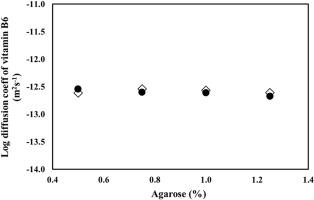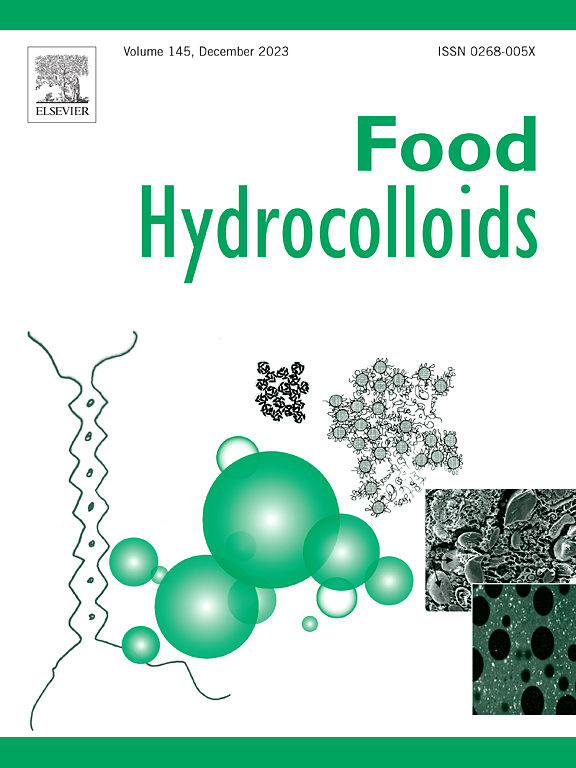利用扩散混合法建模实现乳清蛋白和琼脂糖复合凝胶中维生素 B6 的分子迁移
IF 11
1区 农林科学
Q1 CHEMISTRY, APPLIED
引用次数: 0
摘要
在这项研究中,乳清蛋白和琼脂糖被用作相分离生物聚合物系统,维生素 B6 被用作扩散剂。傅立叶变换红外光谱(FTIR)证实,在实验参数范围内,所有成分之间不存在化学作用。X 射线衍射(XRD)分析证实了维生素 B6 在复合低固混合物中的均匀溶解。共焦扫描激光显微镜阐明了基质的拓扑结构,为相分离的乳清蛋白-琼脂糖网络提供了具体证据。利用小变形动态振荡剪切建立了流变混合定律模型,预测了乳清蛋白和琼脂糖在各自区域内的相体积和有效浓度。随后进行了扩散研究,主张采用新的分子传输混合定律,通过利用每种聚合物在其相内的有效浓度来估算维生素 B6 在复合凝胶中的理论扩散系数。研究结果与使用紫外可见光谱法观察到的维生素在复合凝胶中的扩散系数进行了正面比较。这些结果突出表明了混合法扩散理论在阐明水性生物聚合物复合凝胶中释放的亲水性维生素的分子传输方面的可行性。本文章由计算机程序翻译,如有差异,请以英文原文为准。

Molecular transport of vitamin B6 from whey protein and agarose composite gels using diffusion blending law modelling
In this investigation, whey protein and agarose were employed as the phase-separated biopolymer system, with vitamin B6 acting as the diffusant. Fourier-transform infrared (FTIR) spectroscopy affirmed the absence of chemical interactions among all constituents within the experimental parameters. X-ray diffraction (XRD) analysis corroborated the uniform dissolution of vitamin B6 within the composite low-solid mixtures. Confocal scanning laser microscopy elucidated the topology of the matrix, providing tangible evidence of the phase-separated whey protein-agarose networks. Small-deformation dynamic oscillation in-shear was employed to establish a rheological blending law model, predicting the phase volume and effective concentration of the individual components (whey protein and agarose) within their respective domains. Subsequently, a diffusion study was conducted, advocating a novel blending law for molecular transport to estimate the theoretical diffusion coefficient of vitamin B6 in the composite gel by leveraging the effective concentration of each polymer within its phase. The outcomes were positively compared to the observed diffusion coefficient of the vitamin from the composite gel using UV–vis spectroscopy. These results underscore the viability of the blending-law diffusion theory in elucidating the molecular transport of hydrophilic vitamins released from aqueous biopolymer composite gels.
求助全文
通过发布文献求助,成功后即可免费获取论文全文。
去求助
来源期刊

Food Hydrocolloids
工程技术-食品科技
CiteScore
19.90
自引率
14.00%
发文量
871
审稿时长
37 days
期刊介绍:
Food Hydrocolloids publishes original and innovative research focused on the characterization, functional properties, and applications of hydrocolloid materials used in food products. These hydrocolloids, defined as polysaccharides and proteins of commercial importance, are added to control aspects such as texture, stability, rheology, and sensory properties. The research's primary emphasis should be on the hydrocolloids themselves, with thorough descriptions of their source, nature, and physicochemical characteristics. Manuscripts are expected to clearly outline specific aims and objectives, include a fundamental discussion of research findings at the molecular level, and address the significance of the results. Studies on hydrocolloids in complex formulations should concentrate on their overall properties and mechanisms of action, while simple formulation development studies may not be considered for publication.
The main areas of interest are:
-Chemical and physicochemical characterisation
Thermal properties including glass transitions and conformational changes-
Rheological properties including viscosity, viscoelastic properties and gelation behaviour-
The influence on organoleptic properties-
Interfacial properties including stabilisation of dispersions, emulsions and foams-
Film forming properties with application to edible films and active packaging-
Encapsulation and controlled release of active compounds-
The influence on health including their role as dietary fibre-
Manipulation of hydrocolloid structure and functionality through chemical, biochemical and physical processes-
New hydrocolloids and hydrocolloid sources of commercial potential.
The Journal also publishes Review articles that provide an overview of the latest developments in topics of specific interest to researchers in this field of activity.
 求助内容:
求助内容: 应助结果提醒方式:
应助结果提醒方式:


